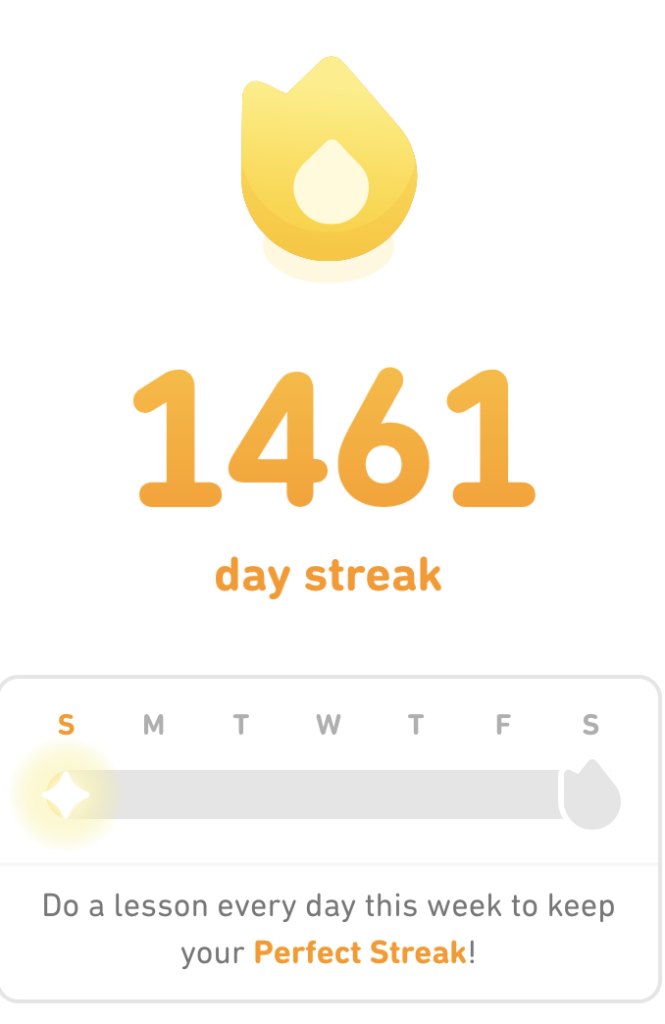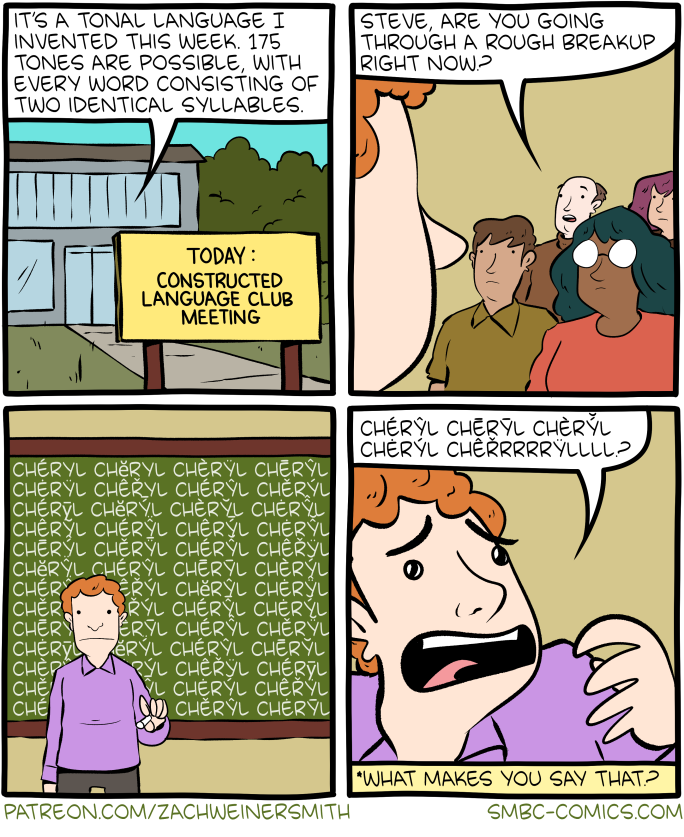
wejvatlh javmaH vagh vI’ cha’ vagh’logh boq’egh loS; chen wa’San loSvatlh javmaH wa’ = 365.25 times 4 equals 1461.
qaStaHvIS tlhIngan Hol vIHaDtaH loS DIS. = I have studied Klingon for four years.
To be specific, I have a streak on Duolingo that’s four years long. I forced my way through it solely so I could make the following statement.
Drum roll, please!
I have now spent more time studying Klingon on Duolingo than I spent studying French in high school and Russian in college combined.
Having derived what dubious pleasure I get out of declaiming that, I’m done with Duolingo.
Why “done”?
I’ve frequently complained about the Klingon Duolingo course. I want to stress that this is not the fault of the course’s authors, the KLI, or anyone else associated with its creation. The problem is with Duolingo’s changes to its course model and its current lack of support for smaller language courses, which includes Klingon.
In recent months the lessons have become ever more tedious and repetitive. I’m not learning Klingon at this point. The course is showing me the same phrases over and over again. I can’t tell you the number of times the course gave me the sentences jIDIvbe’ba’ = “I’m definitely not guilty” or ghuQmey law’ qon SeQpIr = “Shakespeare composed many poems.”
Four years is nowhere near a record. Someone on the Klingon Language Discord posted a screenshot of their 1700-day streak. I can’t pursue that goal. I’ve translated Suvrupghach = “combat readiness” so many times that my brain would rebel if I did it any further.
The last new phrase I was presented in the course was on 4-Dec-2024, four days before I’m posting this essay: jItlhutlh jI’ojmo’ = “I drink because I am thirsty.”
The final Duolingo exercise I was offered was to translate “The windows are colorless” into Klingon: Dem Qorwaghmey, another phrase I encountered far too many times in the last few months of exercises.
Klingon and me
Am I done with Klingon?
I think I still have my general curiosity about the language. But…
My original goal in taking the Duolingo course was to learn enough to use it as “Orcish” in an online D&D game. The gamesmaster of that campaign told me that it’s unlikely that he’ll ever resume it. A shame. I looked forward to screaming jaghpu’ tIHoH! = “Kill the enemies!” in future encounters.
The Klingon Language Institute (KLI) has a members-only language course that I may resume. I started it, but it became a bit boring for me; the first few lessons go over material I already know, and you can’t skip ahead in the course.
I subscribe to Hol ‘ampaS = “Klingon Language Academy” on Facebook for their Klingon Word of the Day. I occasionally use the boQwI’ = “assistant” app on my Mac to translate some word or phrase when I see Klingon used in a TV series.
However, if I’m being honest, the glow of learning a new language has faded.
After four years of Klingon, I still could not compose a few simple sentences correctly. I still don’t know how to say “Attack the strongest!” which was my original goal in starting on this linguistic journey. (According to KGT (see below) it may not be possible to say that!)
It doesn’t help that, as a conlang, Klingon words are mostly random collections of consonant-vowel-consonant combinations. For example, Qup = “be young”, QIp = “be stupid”, Qap = “to operate”, Qop = “be worn out”, Qep = “to be anxious”.

Yes, this happens in DIvI’ Hol = English as well (there’s no relation between “cough”, “tough”, “bough”, “rough”), so perhaps I shouldn’t complain.
However, consider this:
tem = electron
valtIn = proton
yomIj = neutron
There’s no relationship between these words nor any others that gives you a clue about what related words could be. In English, we have the “tron” suffix which suggests some connection. In Klingon, nothing.
There’s a word for quark = ngojchuH. That looks like it’s supposed to be a combination of two words, ngoj and chuH. But ngoj = “to be restless” and chuH means either “to throw” or “to clarify”. I suppose that might relate to using a pay’an chungwI’ = “particle accelerator” to break apart a valtIn into its constituent parts; I’m not sure how.
There’s no word for “neutrino”, which would be essential to discussing my scientific work. As an English speaker, my temptation would be to translate “neutrino” (which means “little neutral one”) as yomIjHom = “lesser neutron”, but is this correct? I can’t tell.
For me, Klingon has started to revert back to what it looks like to outsiders: A bunch of nonsense-sounding syllables strung together in ways that make no sense. Much of the language has turned into brute-force memorization of unrelated sounds.
I know some vocabulary and some grammar, but I don’t grok the language.
I think my Klingon fling is ending.
Klingon and you
Just because I’m moving away from it doesn’t mean you should. There’s a thriving community of Klingon-language students and teachers.
If you’re interested in learning Klingon, the essential book is The Klingon Dictionary (TKD) by Marc Okrand. It contains the core grammatical concepts and the basic vocabulary that Okrand developed for the earlier Star Trek movies.
For the next step, I’d recommend Klingon at Conventions by Lieven Litaer. The author is a well-known Klingon-language teacher. In the book, he has sample conversations that one might have at a Star Trek convention, and he breaks down each sentence with both a grammatical and pronunciation guide. You’ll learn exactly why and how to say tlhIngan Hol vIghoj vIneH = “I want to learn Klingon.”
I’d also recommend joining the KLI. Membership is inexpensive. It allows you to take their beginner’s Klingon course, which is superior to the current Duolingo course. It also gives you access to the Klingon Discord server, which has channels ranging from beginner questions to Klingon-only conversations.
On the KLI site you can get merchandise such as the back issues of HolQeD, the Klingon language journal. The difficulty level of the articles varies widely; some are are intended for beginners while others are by grammarians discussing high-level topics. It’s the best resource for understanding the finer points of the language.
I consider other Klingon works to be “inference” rather than “reference”; that is, you can use them to deduce things about Klingon, but you can’t use them to look up vocabulary or other topics.
The Klingon Way (TKW) is a collection of phrases in Klingon, most of which come from the movies or TV series, along with English commentary. For example qaStaHvIS wa’ ram loSSaD Hugh SIjlaH qetbogh loD = “Four thousand throats may be cut in one night by a running man”, which is said (in English) in the original Star Trek series episode Day of the Dove. (Why Hugh = “throat” and not HughDu’ = “throats”? I don’t know.)
For Klingon grammarians, TKW is interesting because it provides large number of examples of how to use the (rather limited) Klingon rules of grammar in TKD to compose sentences in ways that were not explicitly defined in TKD.
TKW appears to be out-of-print, but I recommend trying to get the printed version. The audiobook version is interesting to listen to, but you can’t break down the Klingon sentences and use them to learn anything.
I’ll be controversial and give a “thumbs down” to Klingon for the Galactic Traveler (KGT). To me (and perhaps only to me), it reads like a lengthy apologia for all the mistakes made by inexperienced Klingon translators in the movies and series.
Beyond these books, the others I’ve seen are basically novelties. The translations (or “restorations”) that I own are:
- Hamlet in the original Klingon (with SeQpIr‘s clumsy translation).
- QelIS boqHarmey = Alice’s Adventures in Wonderland with an English “backtranslation” of what the Klingon means in English.
- Sun pIn’a’ veS mIw = Sunzi’s Art of War, a Klingon version of the original Chinese with an English translation as well.
For learning Klingon, I’d skip over the Klingon-only translations without the accompanying English; for example, ta’ puq mach = The Little Prince and ‘aS ‘IDnar pIn’a’ Dun = The Wonderful Wizard of Oz. They’re pleasant to own, but there’s no hope of learning Klingon from them unless you’re already fairly familiar with the language.
After that, it’s up to you.
ghIj qet jaghmeyjaj = “May your enemies run with fear!”